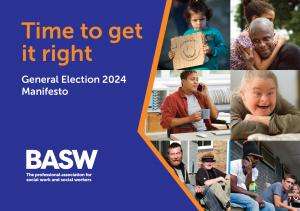General Election Blog: The Importance of Lived Experience

Policy and service co-production: the importance of lived experience
People with lived experience of social work services – which includes families at all points of the spectrum of intervention and support – need to be routinely included in the delivery, review and development of services (summarised as co-production). It enables meaningful involvement, ensures inclusivity and enhances accountability. As well as being the ethically right thing to do it makes practical sense too.
BASW connects with many people with lived and living experience of social work services who continue to enrich our work. Greater co-production with experts by experience of social work is one important part of our ongoing commitment to engagement and effective services. We therefore urge the next UK Government to ensure that experts be experience are involved from idea conception to implementation when it comes to the development of policies and services.
Over the last few years, we’ve heard more and more about the importance of involving people with lived experience in policy. Experts by experience (EBEs), in a social work context, are people who have experience of using social work services: they could have been in care, had support with mental or physical health needs, gone through the immigration system, or received help for drug or alcohol misuse.
Some experts by experience haven’t used services directly, but have supported or cared for a family member or loved one who has. EBEs then use this experience to inform different parts of an organisation, whether that be strategy, policy, campaigns, or other projects.
Like social workers themselves, EBEs have intimate knowledge of services — only they come from a different angle, having had to navigate them as a service user rather than provider. This can be deeply enriching — EBEs sometimes have a totally different perspective, articulating gaps between what services and social workers intend to do and how they are really felt, lived, and experienced. They may also have a better insight into the intersections of services, experience and identities, helping us understand the barriers different communities face when trying to access support. The combination of lived and academic experience is therefore vital to get the full picture of how services should work.
Simply paying lip service to involvement, however, is not enough. Many projects bring in EBEs very late, give them little to no real decision-making power, or silo them away from others involved in service development. For a truly innovative, equal way of working we need to ensure that true co-production is happening — that is, people with lived experience need to have equal power to make decisions about service development, working in collaboration with social workers and policymakers to ensure that their views are not only listened to but deeply embedded in services going forward.
Changes in services are important for all of us, but are often most intimately felt by those who use them. Any work on the delivery and development of services, therefore, is incomplete without the knowledge and expertise of people who use services. This is the only way of making sure that policy and services alike serve those they are intended to support.
